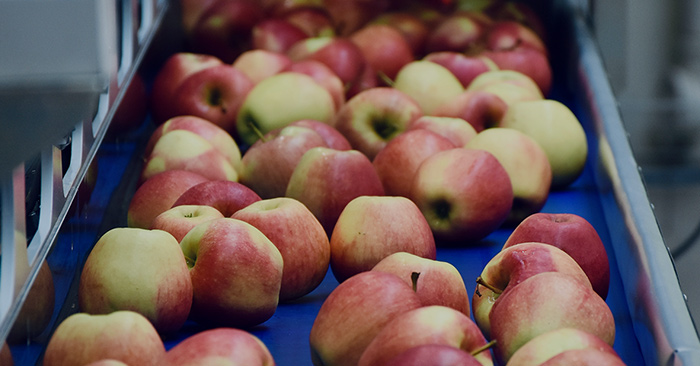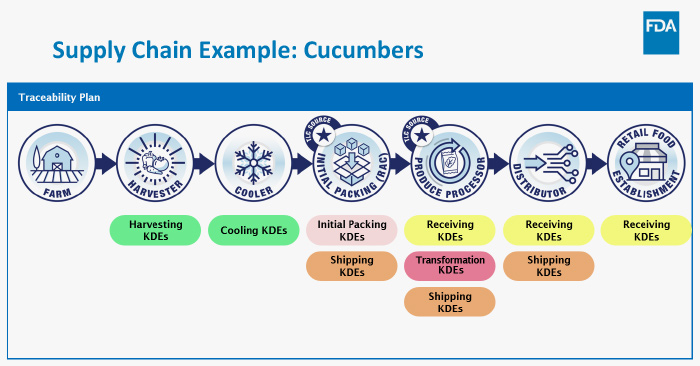FDA Unveils Food Traceability Final Rule, Disadvantaging Small Food Makers

In an effort to create an even safer food system, the U.S. Food and Drug Administration (FDA) published its Food Traceability Final Rule on Tuesday laying out the government’s plan to identify and remove potentially contaminated foods from consumer markets more efficiently.
Although intended to improve the already complex system of food safety oversight, the Final Rule could be putting smaller businesses at a disadvantage due to the complexity of the FDA’s mandate.
Officially titled the Requirements for Additional Traceability Records for Certain Foods, the Final Rule was initially proposed in 2020 with a public comment period for food makers and stakeholders open until early 2021. The Final Rule is a component of Section 204 of the FDA Food Safety Modernization Act (FSMA). The FSMA was enacted in 2011 and implemented in 2017 as a framework to help the FDA prevent and react to foodborne illness outbreaks. Over the last three years, the FDA has tried to use more digital tracking technology, already used by many distributors and retailers for supply chain efficiency, to monitor potentially contaminated food.
The compliance date for all persons subject to the recordkeeping requirements is January 20, 2026. The rule provides the New Era of Smarter Food Safety initiative “even greater end-to-end food traceability across the food system,” said Frank Yiannas, FDA deputy commissioner for food policy and response, in a press release.
“This standardized, data-driven approach to traceability recordkeeping helps create a harmonized, universal language of food traceability that will help pave the way for industry to adopt and leverage more digital, interoperable and tech-enabled traceability systems both in the near term and the future.”
The Final Rule lays out the required chain of ownership for items on the Food Traceability List (FTL). The list includes food products such as nut butters, ready-to-eat salads, leafy greens, cheeses, shell, eggs, shellfish, fish, and many varieties of fresh fruits and vegetables.
According to the Final Rule, parties who manufacture, process, pack, or hold these foods (or ingredients derived from these foods) are required to maintain key data elements (KDEs) for certain critical tracking events (CTEs) in the food’s supply chain. CTEs are points along the supply chain when a food is transferred or transformed whether that is cooled, repackaged or adulterated into a new form or product.
During this process a food product will be given a traceability lot code (TLC) which is an alphanumeric marker that is included during a food’s movement through the supply chain and includes all the previous KDEs logged and CTEs the product went through.
For example, a case of leafy greens destined for a spring mix salad container must follow specific guidelines before it can be put in a clamshell container in a supermarket cold case.
On the farm, the greens are harvested and KDEs are logged providing the relevant information of date and origin of the lettuces. When the greens are stored in a cooling location, more KDEs are logged that include the type of cooling system, temperatures, location, etc. Once the lettuces are sent to their first packing location, they are assigned a TLC that includes all the KDEs previously logged. After packing, the greens move on through the supply chain to produce processors and distributors who log more data as the salad mix is repackaged into smaller retail sizes. Retail food businesses will receive the TLC with all of this logged data (KDEs) when the packaged salad mix arrives. Retailers will be required to provide that information within 24 hours of a FDA request.

This recordkeeping – hardcopy or digital – enables the FDA to trace potentially contaminated food more effectively through the supply chain and quickly alert distributors, retailers and the general public during a foodborne illness investigation.
The hope would be that the Final Rule could help prevent expansive food recalls like the one J.M. Smucker’s JIF brand had to issue in April. If alerted to the potentially contaminated peanut butter earlier, FDA investigators might have been able to prevent the spread of the recall into other finished goods like Walmart-branded fudge and vegetable snack packs sold with peanut butter.
Yet, smaller food companies and businesses who use “high risk” foods in their manufacturing processes, which could include everything from salsa made with vegetables to cookies made with nut butters, might be disadvantaged by the additional data logging which could eat into the already slim profit margins.
The Food Industry Association (FMI) responded to the FDA’s Final Rule announcement with a measured response, citing the organization’s commitment to strengthening food safety while maintaining standards that are achievable for companies of all sizes.
“It is already clear that implementation of the requirements in the rule will demand tremendous investments of time and resources across the entire food industry, and it looks like this rule significantly exceeds the statutory authority, both written and intended, by Congress,” said FMI Chief Public Policy Officer Jennifer Hatcher in a statement.
The FMI previously called for the FDA to issue a Supplemental Rule as opposed to a Final Rule that would create a less complex and taxing recordkeeping process that could more judiciously fit both multinational food companies as well as smaller, artisanal businesses with fewer resources to devote to data management.
“This work needs to be done in the most efficient, consistent manner across all elements of the food supply chain with the least possible impact on food prices, greatest impact on results, and consistency with the intent of the law passed in 2011,” Hatcher said. “Based on our quick review of this incredibly complex rule, it does not accomplish this.”
The National Grocers Association had a similar response to the FDA’s news saying that the Final Rule exceeded the FDA’s federal mandate because the Food Safety Modernization Act “explicitly prohibits case-level tracking and electronic recordkeeping.”
“Smaller retailers will be disproportionately impacted by this final rule as it will be expensive to implement and require additional labor that many stores cannot spare,” said VP of government relations Stephanie Johnson.
















